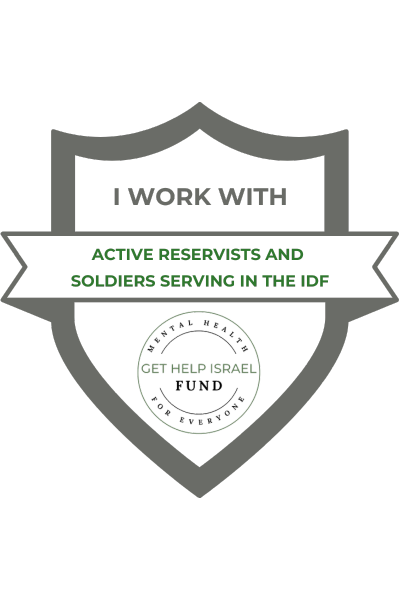Raisa Stinson
Credentials
Trauma Therapist
Finances
Licensed Abroad
- Dizengoff Street
- Netanya
- Ahuza 130, Clinicot Offices
- Raanana
- Druyanov 5, ADVAH clinic
- Tel Aviv
- Email Me
- FREE CONSULTATION
-
 Business HoursFridays/Weekends
Business HoursFridays/Weekends
Raisa Stinson
 Verified
Verified
Credentials
Mental Health Counselor
Trauma Therapist
MA
Finances
250-350 NIS
N/A
Free Consultation
- Dizengoff Street
- Netanya
- Ahuza 130, Clinicot Offices
- Raanana
- Druyanov 5, ADVAH clinic
- Tel Aviv
ABOUT THE THERAPIST
Many people these days feel lonely, isolated, confused, misunderstood, and overwhelmed. Depression and anxiety are very common. If you are feeling this way, you are not alone.
Almost all of us have experienced multiple traumas, which impair the way we perceive the world, the way we feel about ourselves, our ability to trust others, form meaningful relationships...the list goes on.
Whether you have just one hour, or many months to address your past and present traumas, I am here to help you!
A few words to introduce myself:
I have decades of life experience, which helps me understand people better. I lived and worked in several countries, including former Soviet Union, Malawi, Rwanda, Thailand, and, of course, United States. I've been a stranger in a strange land more than one; I understand difficulties of adjusting, finding yourself in a new environment, a new culture.
I am certified in EMDR by EMDRIA (EMDR International Association); I have been trained in Flash Technique, aimed to provide "first aid” to persons with severe psychological trauma.
I put establishing trusting therapeutic relationship first.
I listen hard, for what is expressed with the words, and especially for anything that is difficult to express with words.
I use a variety of therapeutic approaches and techniques to help you figure out how you can help yourself.
All kinds of psychological trauma, low self-esteem, anxiety and panic, depression, difficulties with relationships.
I work with couples and families, helping them express their feelings and thoughts to one another, reduce misunderstanding, increase compassion.... and have more fun!
I offer virtual sessions as well as in-person sessions. I can see you in Tel Aviv, Ra'anana, or Netanya.
I will not turn anyone away because of financila difficulties.
My hours are flexible, but contact me for the specific time when you are ready to make an appointment.
QUALIFICATIONS
MA
Goddard College
2015
Degree
MAEducation
Goddard CollegeYear of Graduation
2015Years in Practice
9
LICENSED IN THE USA
ADDITIONAL CREDENTIALS
Certification in Eye Movement Desensitization and Reprocessing (EMDR), February 2022
EMDR Certified Therapist - EMDRIA - 2024
Certification in Traumatic Stress studies, 2016
Trauma sensitive yoga facilitator, 2019
DISTANCE COUNSELING
Online Therapy
PRIMARY SPECIALTIES
Anger Management
Anxiety / Panic
Depression
Stress Management
Trauma / Post Traumatic Stress Disorder PTSD
ADDITIONAL SPECIALTIES
Abuse
Addictions
Child Abuse
Couples / Relationship / Marriage Counseling
Family Issues
Life Transitions
Parenting Issues / Training
Phobias
Self-Esteem
Sexual Abuse / Rape
Stress Management
CLIENT FOCUS
Population
Adolescents
Adults
Couples
Men
Women
Languages Spoken
English
Russian
TREATMENT APPROACH
Body-Mind PsychotherapyBody-mind psychotherapy is an integrative approach to psychological treatment that draws from both psychotherapeutic and somatic/body-based approaches. It emphasizes the interconnection between physical, emotional, cognitive and spiritual aspects of being. This approach seeks to help individuals explore how physical sensations, emotions, thoughts and beliefs influence their behavior and well-being. Through this exploration, individuals can gain insight into how the body and mind interact to create patterns of behavior, and how those patterns can be changed to promote healing and wellness.
Cognitive Behavioral Therapy (CBT)Cognitive Behavioral Therapy (CBT) is a type of psychotherapy that focuses on how one's thoughts, feelings and behaviors are connected and can be changed. It is based on the idea that how we think (cognition) and how we feel (emotion) can influence how we behave. CBT helps people identify and challenge distorted thinking and replace it with more balanced thinking, leading to improved mood and behavior. ‘Homework’, usually containing practical writing exercises, is often completed by the client between sessions to reinforce the therapy. Examples of tools that practitioners often use are journaling, challenging beliefs, and mindfulness.
Dialectical Behavior Therapy (DBT)Dialectical Behavior Therapy (DBT) is a type of cognitive-behavioral therapy developed by Marsha Linehan to help people learn to better manage and cope with emotions and stress. It focuses on developing skills and strategies to help regulate emotions, improve relationships and communication, and reduce self-destructive behaviors. Through DBT, people learn to identify and modify unhealthy thoughts and behaviors, while also learning to accept and validate their own feelings. DBT teaches skills to help individuals become aware of and accept and regulate their emotions, tolerate distress, and improve interpersonal relationships.
Eye Movement Desensitization and Reprocessing Therapy (EMDR)Eye Movement Desensitization and Reprocessing (EMDR) is a psychotherapy treatment that was originally designed to alleviate the distress associated with traumatic memories. It uses a structured approach to address the past events that may be causing current distress, and uses bilateral stimulation, such as eye movements, to activate different neural networks in the brain in order to reduce symptoms of trauma. EMDR has been found to be effective for a wide range of mental health issues, including anxiety, depression, and PTSD.
Guided ImageryGuided imagery is a form of visualization used for relaxation and healing. It uses the power of the imagination to create positive changes in a person's thoughts, feelings, and behaviors. It is also used to reduce stress and anxiety, cope with physical and emotional pain, increase motivation, confidence, and self-esteem, and to improve focus and concentration. During a guided imagery session, the practitioner will guide the client through a series of visualizations, using words and descriptions to help them create mental images in their mind. These visualizations can take many forms, such as a comforting place from the past or the client’s future goals.
Internal Family Systems (IFS)Internal Family Systems (IFS) is an evidence-based psychotherapy that uses the metaphor of an internal family of parts to help people gain awareness of how different parts of themselves can interact in healthy and unhealthy ways. IFS encourages people to become curious about their different parts, with the goal of helping them gain access to their true Self or core. Through this process, people can learn to recognize and care for the different parts of themselves, as well as develop compassionate understanding for the origins of their parts. A key principle of IFS is that each part within the person has its own positive intention and is trying to protect the person in some way. By understanding the positive intention of each part, the practitioner and client can work together to help the parts feel heard and understood, and to find more adaptive ways of meeting their needs. IFS has been found to be an effective treatment for a variety of mental health issues, including depression, anxiety, trauma, and relationship issues.
Trauma-Focused Cognitive Behavioral Therapy (TF-CBT)Trauma-Focused Cognitive Behavioral Therapy (TF-CBT) is an evidence-based practice used to help children, adolescents and their parents who have experienced a single or multiple traumatic events. This type of therapy combines cognitive and behavioral strategies to help people process their traumatic experiences, manage their distress, develop coping skills, and restore their sense of safety and well-being. TF-CBT focuses on education and skill-building, creating an environment of safety and trust, and using therapeutic activities to help people understand their responses and control their symptoms. Children are shown how perceptions may be distorted and are given the tools to redesign those perceptions. TF-CBT is a skills-based model, and it requires the child and parent to practice its components in order to be optimally effective. Parents and children are commonly asked to practice skills at home.
EMDR
SERVICES OFFERED
Individual Therapy
Consultation
Couples Therapy
Family Therapy

 Verified
Verified



